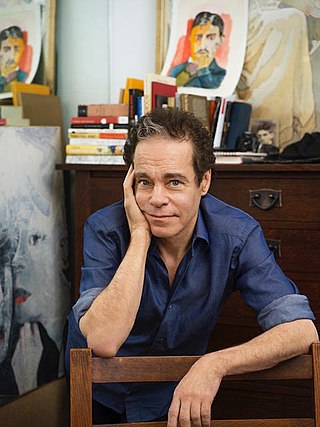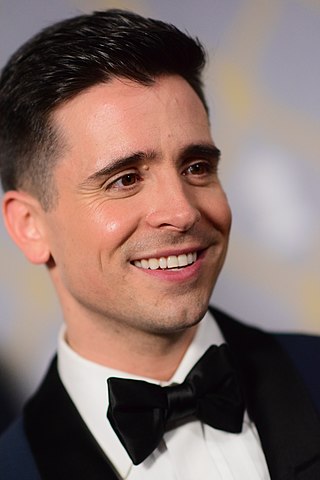Related Research Articles

Musical theatre is a form of theatrical performance that combines songs, spoken dialogue, acting and dance. The story and emotional content of a musical – humor, pathos, love, anger – are communicated through words, music, movement and technical aspects of the entertainment as an integrated whole. Although musical theatre overlaps with other theatrical forms like opera and dance, it may be distinguished by the equal importance given to the music as compared with the dialogue, movement and other elements. Since the early 20th century, musical theatre stage works have generally been called, simply, musicals.

Hair: The American Tribal Love-Rock Musical is a rock musical with a book and lyrics by Gerome Ragni and James Rado and music by Galt MacDermot. The work reflects the creators' observations of the hippie counterculture and sexual revolution of the late 1960s, and several of its songs became anthems of the anti-Vietnam War movement. The musical's profanity, its depiction of the use of illegal drugs, its treatment of sexuality, its irreverence for the American flag, and its nude scene caused controversy. The work broke new ground in musical theatre by defining the genre of "rock musical", using a racially integrated cast, and inviting the audience onstage for a "Be-In" finale.

An off-Broadway theatre is any professional theatre venue in New York City with a seating capacity between 100 and 499, inclusive. These theatres are smaller than Broadway theatres, but larger than off-off-Broadway theatres, which seat fewer than 100.

Bye Bye Birdie is a stage musical with music by Charles Strouse and lyrics by Lee Adams, based upon a book by Michael Stewart.

Stephen Lawrence Schwartz is an American musical theatre composer and lyricist. In a career spanning over five decades, Schwartz has written hit musicals such as Godspell (1971), Pippin (1972), and Wicked (2003). He has contributed lyrics to a number of successful films, including Pocahontas (1995), The Hunchback of Notre Dame (1996), The Prince of Egypt, Enchanted (2007), and Disenchanted (2022).

Charles Strouse is an American composer and lyricist best known for writing the music to such Broadway musicals as Bye Bye Birdie, Applause, and Annie.

Broadway theatre, or Broadway, is a theater genre that consists of the theatrical performances presented in 41 professional theaters, each with 500 or more seats, in the Theater District and Lincoln Center along Broadway, in Midtown Manhattan, New York City. Broadway and London's West End together represent the highest commercial level of live theater in the English-speaking world.

Marc Kudisch is an American stage actor, who is best known for his musical theatre roles on Broadway.

A show tune is a song originally written as part of the score of a work of musical theatre or musical film, especially if the piece in question has become a standard, more or less detached in most people's minds from the original context.

Steven Sater is a Tony Award, Grammy Award, and Laurence Olivier Award-winning American poet, playwright, lyricist, television writer and screenwriter. He is best known for writing the book and lyrics for the Tony Award-winning 2006 Broadway musical Spring Awakening.
Kevin Adams is an American theatrical lighting designer. He has earned four Tony Awards for lighting design.

Hedwig and the Angry Inch is a rock musical with music and lyrics by Stephen Trask and a book by John Cameron Mitchell. The musical follows Hedwig Robinson, a genderqueer East German singer of a fictional rock and roll band. The story draws on Mitchell's life as the child of a U.S. Army major general who once commanded the U.S. sector of occupied West Berlin. The character of Hedwig was inspired by a German divorced U.S. Army wife who was Mitchell's family babysitter and moonlighted as a prostitute at her trailer park home in Junction City, Kansas. The music is steeped in the androgynous 1970s glam rock style of David Bowie, as well as the work of John Lennon and early punk performers Lou Reed and Iggy Pop.
Diane Marie Paulus is an American theater and opera director who is currently the Terrie and Bradley Bloom Artistic Director of the American Repertory Theater at Harvard University. Paulus was nominated for the Tony Award for Best Direction of a Musical for her revivals of Hair and The Gershwins' Porgy and Bess, and won the award in 2013 for her revival of Pippin.

Matthew Finnen Doyle is an American actor and singer known for his work in musical theatre. He made his Broadway debut in 2007 in Spring Awakening as a replacement for the roles of Hanschen and Melchior. He later had supporting roles in the Broadway productions of Bye Bye Birdie in 2009 and War Horse in 2011. He joined Broadway's The Book of Mormon in 2012, replacing Nic Rouleau as the starring role of Elder Price. Following a period of performing Off-Broadway and regionally, which included starring as Anthony Hope in the 2017 Off-Broadway revival of Sweeney Todd: The Demon Barber of Fleet Street. He joined the Broadway transfer of the gender-swapped production of Company in 2021 playing the role of Jamie originated by Jonathan Bailey in the West End. For his performance, he won the Tony Award for Best Featured Actor in a Musical. In 2022, he returned to the Off-Broadway stage as Seymour Krelborn in the revival of Little Shop of Horrors.
The Young People's Teen Musical Theatre Company is a performing arts company located in San Francisco, California. Its mission is to provide exposure to and training in musical theatre and other forms of live performance. Founded in 1984, the group is sponsored by the San Francisco Recreation & Parks Department and supported by a 501(c)(3) non-profit, Friends of the Company.

Jagged Little Pill is a jukebox musical with music by Alanis Morissette and Glen Ballard, lyrics by Morissette, and book by Diablo Cody, with additional music by Michael Farrell and Guy Sigsworth. The musical is inspired by the 1995 album of the same name by Morissette and deals with pain, healing, and empowerment. It premiered at the American Repertory Theater in Cambridge, Massachusetts, on May 5, 2018, directed by Diane Paulus.

Lauren Marie Patten is an American actress, singer, and writer best known for originating the role of Jo in the Broadway musical Jagged Little Pill, as well as playing Officer Rachel Witten in the crime series Blue Bloods. For her performance in Jagged Little Pill, Patten won the Tony Award for Best Featured Actress in a Musical.
References
- ↑ Wollman, p. 14
- ↑ Ann-Margret, who starred in the movie version of Bye Bye Birdie, later starred in the movie version of Tommy
- ↑ Everett, William A. and Paul R. Laird, The Cambridge Companion to the Musical (2002) Cambridge University Press, pp. 231-33 ISBN 0-521-79639-3.
- ↑ Kenrick, John. "History of the Musical Stage 1960s: III – Rock: 'The Age of Aquarius'", Musicals101, accessed May 11, 2009
- 1 2 3 Kenrick, John. "The 1970s: Part I-Rock Musicals". History of The Musical Stage. Musicals 101. Retrieved 2009-05-11.
- ↑ Barnes, Clive (October 24, 1972). "Theater: Musical Pippin at Imperial". The New York Times. p. 37.
It [Pippin] is a commonplace set to rock music
- ↑ "O'Keefe's peppy and melodic pop-rock score is played by a five piece combo": Sommer, Elyse. Bat Boy, curtainup.com, based on March 22, 2001 performance, accessed May 11, 2009
- ↑ Brasor, Philip, "A thumbnail history of the rock musical, March 9, 2006
- 1 2 3 4 5 6 7 8 Pareles, Jon. "Broadway Rocks. Get Over It". The New York Times, May 12, 2010, accessed June 10, 2010
- ↑ Paulson, Michael. "Jagged Little Pill to Close on Broadway, Citing Omicron", The New York Times, December 20, 2021